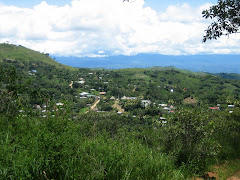I arrived at a time of significant change in Ecuadorian politics. On Sunday, September 30, Ecuador will elect a Constituent Assembly, consisting of 24 national, 100 provincial, and 6 international representatives, responsible for creating a new constitution (mind you, the 20th in the history of the republic). In a referendum held this past April, 85 percent of the population supported President Correa’s proposal for a Constituent Assembly with said task. Once the new constitution is written, another referendum will take place to approve it.
The number of candidates running in this campaign is overwhelming. Every party, movement, or alliance has a designated list number. In total, there are 3,229 candidates, distributed in 26 national lists, 428 provincial lists, and 44 lists from the exterior (6 international representatives will be elected to represent emigrants). And out of these 3,229 candidates, only 130 will be elected! The voting sheet itself is “like a blanket,” my host sister commented. On Election Day, each person must (voting is obligatory) select 24 national candidates on one sheet, and x number of candidates for their respective province (this number depends on the population of each province). There are 23 provinces in the country. People con vote “a la plancha” (drawing a vertical line down one party list) or across party lines. This is a very complicated and inefficient election process because of the system being used and because there is little information on the candidates and proposals of each party. Add existing clientalism and now my head hurts. NDI has been in Ecuador for the past year trying to help improve political dialogue and promote democratic practices within political parties (NDI also had a presence in 2002 when it helped create Participacion Cuidadania “Citizen Participation,” a citizen-formed group that helps monitor elections). NDI recently organized five forums in five cities around the country, in which citizens expressed their opinions of political parties and their representatives. The results were distressing. Frustration and resignation. NDI, in turn, has advised different political parties on how to become more transparent and thereby gain the trust and support of the populace. For my first task, I listened to a couple of these forums and summarized candidates’ key proposals. A comparative table will be published to better inform the citizenry of the reforms and ideas considered by the major parties. I hope this new Assembly will help Ecuador in the long run. On a final note, I’m glad to be an American.
Subscribe to:
Post Comments (Atom)


No comments:
Post a Comment